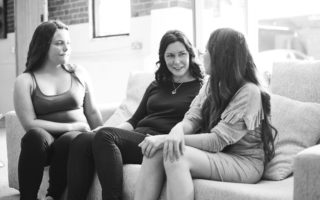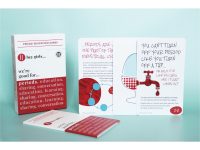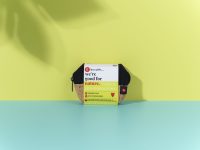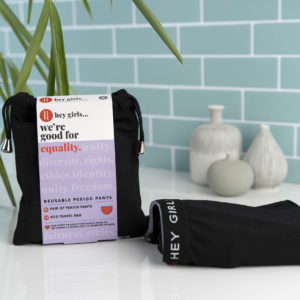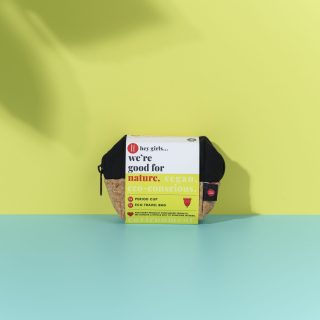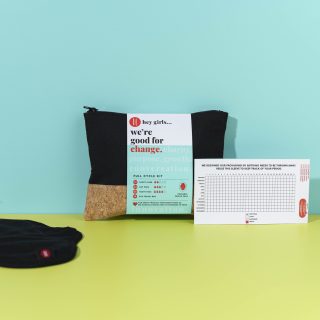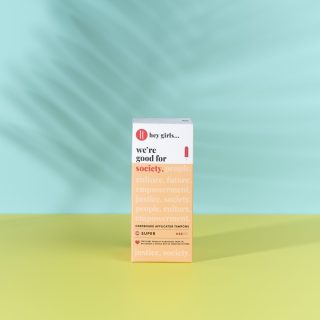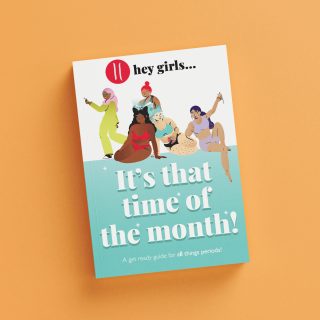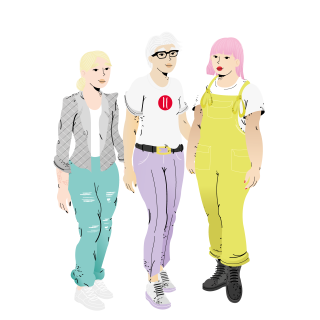1. Why do periods happen?
Each month from puberty onwards, chemicals inside of you (called hormones), cause the body to release an egg from one of the two egg sacks, called ovaries. This is where all of your eggs are stored. The egg then travels to the womb. Only if the egg meets sperm released from a boy during sex will it slowly develop over 9 months into a baby.
Usually, the egg just passes right through without being fertilised and just dissolves. Since the womb no longer needs to be ready to grow the egg, it sheds the extra blood and tissue it made out through the vagina. This loss of tissue is called menstruation or the period.
This cycle will happen nearly every month except when being pregnant or until there are no more eggs to release, usually between the ages of 45 and 55 when you reach the menopause.
2. When will I get my period?
Periods are a sign that you have reached puberty. The first period usually happens between the ages of 10 or 13, but could begin as early as aged 8 or as late as aged 17.
3. How will I know that my period is coming?
There may be signs such as the breasts becoming tender and the abdomen (tummy) may swell and feel uncomfortable. You might even feel tired and a bit moody and get a crampy feeling in the lower back, legs or tummy. Some of us get a bit grumpy and can get a little spotty a few days before their period is due to start. Gradually you will get to know your own signs and be prepared. It takes between 4 to 6 years for your menstrual pattern to become well established.
4. How long will my period last for?
About 3 to 7 days. There is a small amount of blood at first and getting heavier for the first few days and then less blood until it stops. Sometimes the blood is a rusty colour and quite watery and sometimes it can be dark red and thicker.
Only a small amount of blood, barely an eggcup full, is lost and the rest is tissue cells from the lining of the uterus totalling between one half and one whole cupful of liquid over the whole period.
5. How often will I have my period?
About once a month. The days between the first days of your bleed to the first day of the next month are known as the Menstrual Cycle. It can be as little as 25 days or as long as 35 days between bleeding and it can change month to month. For the first few years of having your period, your cycle can vary quite a bit before you settle into a regular rhythm
6. What should I use when I’m on my period?
There are a range of period products that you can use during your periods. some are internal (they go inside you) and others are external (they go in your underwear). Some are reusable and some are disposable (you throw them away after one use). Everyone has different preferences about what they like best, so shop around a bit to see what suits you.
- Pads fit inside your pants by means of a sticky strip, which keeps the pad in place. There are different types of pad and it is a matter of choice, which style you use. There are pads with and without wings. Some are for the earlier days of your period when the blood loss is heavier, and others for less heavy days towards the end of your period. Many companies make night pads which are often bigger and a bit longer.
- Tampons are also available in different sizes to suit the amount of blood lost during a period. Some tampons you insert using only your index finger, and other tampons have a cardboard or plastic applicator to help you to insert it into the vagina.
- Reusable Pads are just like disposable pads except that you can wash them and reuse them.
- Period Pants are worn like normal underwear and have additional layers of fabric that will absorb period blood so you don’t need to wear any other protection with them. They are great for wearing to school, sports or for bed as they can be worn for up to 12 hours, then simply wash and wear again. Everyone’s choice of product and experience during their period is individual and you should decide what works best for you.
- Menstrual cups are small, flexible cups made of silicone or latex rubber. Instead of absorbing your flow, like a tampon or pad, it catches and collects it. ‘Check out our Give a Cup a Go page to find out more’
7. How will I feel during my periods?
You may feel tired and a bit grumpy if your periods are very heavy. Make sure that you take time to relax and do make sure that you take care of your diet to avoid becoming over tired by eating sensibly.
8. Will my period hurt?
The actual bleeding does not hurt at all. Many of us get cramps that can be felt in the legs, lower back and tummy. This cramping is usually caused by your body’s response to a hormone called prostaglandin, which cause the muscles in the uterus to contract. The same hormone can also cause you to get a headache before your period.
Over the counter pain relievers will help if the pain prevents you from doing your usual activities. Putting a hot water bottle or wheat bag on your tummy may help to ease the cramps.
Remember – everyone experiences pain differently. Some folk have very easy periods, for others it can be very sore. If your period is so painful that it stops you from doing the things you would normally do, please see a doctor.
9. Will other people know that I have my period?
Definitely not. No one can tell you are on your period unless you choose to tell them. Periods can be private things, but don’t need to be a secret. If you enjoy exercise, swimming and sport, you will still be able to take part and using the most comfortable pad or tampon will help you to feel more confident during these activities. Remember to change your pad or tampon often to stay comfortable.
10. What’s PMS?
As your period gets closer, it is possible to feel very emotional, moody or even angry. You may even prefer to eat only certain foods, and most likely, crave chocolate. This is called Premenstrual Syndrome or PMS for short. The hormones changing during your cycle cause it, which affects you both physically and mentally.
Feeling bloated is due to water retention, but when your period starts, these symptoms will normally go away. Certain foods can make the PMS worse, so if you think you are suffering then keep a check on your calendar what foods you think make you feel worse.
Supplements such as B6, essential fatty acids and Vitamin E can help to alleviate the symptoms of PMS. If you are badly affected, speak to your doctor about it.
11. What do I do if my period starts in school?
Carry a few pads and/or tampons in your school bag all the time – You can bet that if you don’t need them, a friend will! If you forget, or your period starts earlier than you expected, ask a teacher or the school nurse for supplies.
Some schools have dispensing machines in the toilets, so check them out and keep the correct coins with you if you can. Best to carry some spare pants if you think that your period may be due.
Schools in Scotland should all now have free products available, and some schools in England and Wales introduced free products in 2021.
12. What do I do if the blood leaks through onto my clothes or bedsheets?
Leaking can be embarrassing but it happens to everyone. Don’t panic – blood washes off with water and a bit of salt.
13. Will I still be a virgin if I use a tampon?
Yes, but if you are worried then you may prefer to use a period pad.
14. My friend says that their breasts hurt before her period. Will this happen to me?
Breast swelling and tenderness in the breasts are caused by the changes in the hormone levels just before a period.
It is important to be sensible about the foods you eat and what you drink to help to manage the symptoms. Avoid salty foods and drinks that contain caffeine such as coffee, cola and fizzy drinks. Evening Primrose oil, Borage or flaxseed oil has been shown to be very helpful as are Vitamins B6 and E, also being careful about the types of foods you eat.
Avoid junk foods and try to eat healthy foods based on grains, fish, beans, chicken and fresh vegetables and fresh fruit. Eat organically grown foods if you can and make sure you drink plenty of water too.
15. I have underarm hair as do some of my friends. A few of them really hate it and I am not sure what I should do?
Everyone gets body hair. It is part of the changes your body goes through during puberty. Some people choose to remove the hair but if you are happy with the way you look, there is no need to do anything other than wash carefully each day. If the hair makes you feel unhappy, you can shave, wax, epilate or use a hair removal cream.
16. How much blood will I loose on my period?
People think that you loose a lot of blood when your on your period, for some people this is true, especially if you have a medical condition that can cause a very heavy period. However, the average blood loss is around 1-2 egg cups per cycle.
17. What’s Discharge all about?
In most cases vaginal discharge is clear, white or cloudy, sometimes sticky or tacky and at other times slippery, and doesn’t really smell of anything. However, vaginal infections can occasionally happen and when they do, they affect the smell and appearance of the discharge, as well as commonly causing other uncomfortable symptoms in the vulva.
Go and see a doctor if:
- Your discharge smells fishy
- Your discharge is green, yellow, grey or frothy
- Your vulva is very itchy or burning and you have thick, white and clumpy, cottage cheese-like discharge
- You experience blisters or sores on your vulva
- You experience pelvic pain or bleeding not during your period
- If you have any other concerns.
Vaginal discharge is absolutely nothing to be embarrassed about. It is a completely healthy, normal bodily function. Your body makes discharge to keep your vagina clean, moist and helps keep infections away. Avoid using soapy and perfumed products to keep your vagina “clean”. Your vagina can do that all by itself!
18. Do only girls have periods?
Some girls have periods, but some boys have periods too! The truth is you can’t tell by looking at someone whether they have periods or not. Not all girls have periods and not all people who have periods are girls – some trans and non-binary folk do too.
If you’re looking to support someone or need some support yourself on trans and non-binary people who period, we have put together a list of online resources you might find helpful:
Switchboard: LGBTQ+ Support
https://www.switchboard.org.uk/?gclid=EAIaIQobChMI88Cnt43S9QIVR57tCh3HHgmpEAAYASAAEgITVPD_BwE
Switchboard: LGBTQ+ Helpline
https://switchboard.lgbt/?gclid=EAIaIQobChMI88Cnt43S9QIVR57tCh3HHgmpEAAYAyAAEgI1RfD_BwE
The Mix: Essential support for under 25s
https://www.themix.org.uk/sex-and-relationships/gender-and-sexuality/young-and-trans-5178.html?gclid=EAIaIQobChMI88Cnt43S9QIVR57tCh3HHgmpEAAYBCAAEgK5YvD_BwE
19. What is premenstrual dysphoric disorder (PMDD)?
PMDD is a particularly severe and distressing form of premenstrual syndrome (PMS) that causes both physical and emotional symptoms in the luteal phase of the menstrual cycle (the week or so before a period arrives). Mood symptoms are most pronounced, and can include anxiety, depression, irritability, severe mood swings, difficulty concentrating and fatigue. Other physical PMS symptoms are also common. Many of these come and go but when they happen every cycle, and so severely that they affect quality of life, then they’re a sign that something could be up. Current management includes drugs that can help regulate some of the symptoms, alternative therapies that look at balancing hormones or looking at life circumstances that may be contributing.
20. My cycle is irregular, is that normal?
Once periods have settled into a regular rhythm it’s common for this rhythm to change from time to time, in response to life events, general health and other factors – ill health, stress, weight loss or gain, some medications, some recreational drug use, and certain types of hormonal contraception.
However, sometimes periods never get into a regular rhythm, or change their pattern and become very unpredictable. Periods arriving more frequently than every 24 days, less frequently than every 35 days, or having no regular pattern at all could all be a sign of an underlying issue. Thyroid problems, or the condition Polycystic Ovarian Syndrome (PCOS) can be a cause. PCOS causes higher levels of particular hormones that can cause physical symptoms like excess facial or body hair, acne and weight gain, along with irregular or missing ovulation, caused by excess follicle growth in the ovaries which leads to irregular periods. Hormones are often given as treatment to regulate periods. Alternative therapies that focus on balancing hormones can be effective for some people.
21. What’s my period blood made up of?
Period blood is a mixture of tissue, blood & mucus. After you have a baby postpartum bleeding also has placental tissue in too. It’s totally normal for blood to have clots in too. Most people find clots in their period flow – this is just the normal clotting of blood. If clots are large (bigger than a 10p piece) you should maybe see your GP.
22. What’s Endometriosis?
Endometriosis is being increasingly diagnosed and it is thought that it affects 10% of menstruators worldwide, although a quarter of them may have no symptoms. Tissue similar to the endometrial womb lining starts to grow in other areas of the body outside the uterus (womb), most commonly the ovaries, fallopian tubes and the tissues lining the pelvis. In rare cases it can grow in other parts of the body. Similar to the endometrial lining in the womb, this tissue builds up and sheds during the menstrual cycle in response to hormone changes, leading to inflammation, irritation, pain and scarring. The causes are unknown and the condition can cause severe menstrual pain, other pelvic pain and pain during sex and they can cause infertility. It is not contagious and can happen to anyone with a uterus and ovaries, at any age. There are treatments such as pain killers and hormonal therapy such as oral contraceptives, surgery is also an option for some. Many people have also found certain alternative treatments very helpful for endometriosis.
If you think you might have endometriosis, talk to someone, weather that be a GP, family member or teacher. There are great support groups set up for people who have endometriosis too.
Check out: Endo Support United
23. Can you get pregnant if you have sex on your period?
Yes! sperm can live for 5-7 days, and depending on your cycle you may ovulate during that time.
As long as both people are consenting, it’s absolutely fine to have sex while on your period. But make sure you are using contraception if you don’t want to get pregnant.
24. What happens to your period after you have a baby?
You often bleed for around 6 weeks after giving birth this is called Lochia. (This bleeding can be more or less than 6 weeks). Periods will return to normal eventually, but when this happens is individual to every person.
Breastfeeding/chest feeding people may not get a period for a while after they have a baby due to the hormones released when you feed. Especially if you feed throughout the night, as the hormones are stronger at night time.
Periods can be complex and everyone’s experience of a period is individual to them.
If you are struggling with managing your period, experiencing lots of pain, heavy bleeding or feeling particularly down during your period it’s good to talk to someone you trust for support. It’s a good idea to pop to see your GP if there is something that is causing you particular concern.
